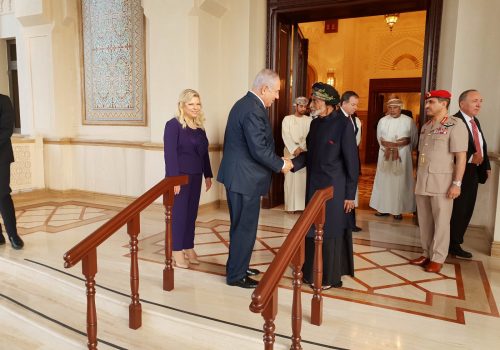Pompeo’s mystery tour to Israel
US Secretary of State Mike Pompeo paid a whirlwind visit to Israel on May 13. With much of global diplomacy relegated to video conferences these days due to the coronavirus pandemic, the timing of Pompeo’s decision to traverse the Atlantic raised more than a few eyebrows. Observers couldn’t help but wonder if America’s top diplomat, his face adorned with a Stars-and-Stripes mask, was hoping for more than just a change in scenery.
Pompeo arrived in Jerusalem as the finishing touches were being put on Israel’s thirty-fourth government. Israeli principals, consumed with the needs of the hour—and returning slowly to regular business after three consecutive elections and over a year of transitional governance—carved out space for their distinguished guest, but had limited attention span for his wares. Less than nine hours after disembarking at Tel Aviv’s Ben-Gurion Airport, the Secretary took off for home.
What was so urgent that Pompeo couldn’t accomplish with a telephone call or, at least, wait a few days until after this week’s fanfare at the Knesset?
Recent weeks have seen a confluence of evidence underscoring America’s steady retreat from the Middle East. The depleted inventory includes two US fighter squadrons which have already departed the region, four Patriot missile batteries and additional military personnel that are following suit, and a pending reduction in the US Navy presence in the Persian Gulf. Secretary of Defense Mark Esper is believed to favor a withdrawal of American troops from the Multinational Force and Observers (MFO), which has buttressed the US-sponsored Camp David Accords between Israel and Egypt for about forty years.
The advent of the coronavirus has only accelerated this trend toward US disengagement from the world. Washington, like other capitals, is concentrated most intently on challenges of public health, with fewer resources or aspirations to invest elsewhere. Under the America First management of President Donald Trump—who has never trusted international institutions—the US has halted funding for the World Health Organization and has doubled down on under-substantiated charges of Chinese indiscretion. In the case of the Middle East, tumbling crude prices have provided further impetus for Trump to decamp from the distant region.
Pompeo’s lightning trip to Israel provided the optics—if not necessarily the substance—of American leadership in world affairs. It presumed to telegraph widely that the US continues to function and that, domestically, the virus has not cowered the administration (Trump has, of course, given his outbreak response a perfect score).
Based on readouts of his discussions with his Israeli interlocutors, Pompeo had three things on his mind: Iran, China, and Trump’s vision for Middle East peace. While it’s always possible that something fresh is afoot in the effort to thwart Tehran’s nuclear ambitions, one could be forgiven for concluding that the issue was a convenient strawman to justify the secretary’s curious journey. An unnamed senior State Department official seemed to confirm this inadvertently when they briefed that “we tend to sort of ignore [the Iranian threat] because it’s a constant.” Either way, the US and Israel were already coordinating closely on Iran before Pompeo’s visit, and would have undoubtedly chugged along even if he’d stayed quarantined at Foggy Bottom.
On China, Pompeo was reportedly assured by Prime Minister Benjamin Netanyahu that Israel will “review” the participation of Hutchison Water International—owned by a holding company based in Hong Kong—in a $1.5 billion bid to build a new water desalination plant at Palmahim. But that message, which pertains to a continual American-Israeli dialogue over the national security implications of incorporating Chinese technologies, could have certainly been delivered over a telephone.
What might have conceivably necessitated the publicity of a Pompeo appearance, however, is President Trump’s re-election strategy to pound China aggressively. Beijing is a campaign twofer, featuring both as a target for blame in the rampant spread of COVID-19 and, additionally, as the alleged focal point of presumptive Democratic presidential nominee Joe Biden’s affections. Pompeo’s semi-cryptic remark to Netanyahu that “you share information, unlike some other countries that try and obfuscate and hide that information, and we’ll talk about that country, too” did Israel no favors, dragging them into Trump’s vendetta with its partisan overtones.
Finally, with regard to Israeli plans to expand national sovereignty to areas of the West Bank, another member of Pompeo’s travelling entourage was quick to “dispel the notion that we flew halfway around the world to talk about annexation.” Indeed, action on this front appears far from imminent. Although Israel’s new government could begin implementing the move as early as July 1, dilemmas abound. Right-wing enthusiasts—including outgoing Defense Minister Naftali Bennett—of extending Israeli control in the West Bank are unhappy with its parallel provisions for Palestinian statehood. Israeli leaders are also conscious of the negative impact that such a step could have on its relationships with the US, Europe, and friendly corners of the Arab world.
The US, meanwhile, is moving toward the back seat on the issue. It’s almost like the yellow light, which White House Senior Advisor Jared Kushner flashed after the rollout of Trump’s vision last January—”the hope is that [the Israel government will] wait until after the election, and we’ll work with them to try to come up with something”—is still turned on. Pompeo has clarified that “this is, in the end, an Israeli decision.” Last week, an anonymous senior US official told Israel’s Channel 13 newscast that July 1 “is not a sacred date” from America’s perspective. Trump, whose electoral base seems more fired up about his pledge to recognize Israel’s dominion over the territory than many Israelis—may have to settle for declaring victory and moving on. “I did it. Nobody else did it. But the Israelis just couldn’t get their act together and decide what they wanted,” the president will proclaim.
Maybe Mike Pompeo just wanted to escape Washington and get some fresh air.
Shalom Lipner is a nonresident senior fellow for Middle East Programs at the Atlantic Council. Follow him on Twitter @ShalomLipner.
Image: U.S. Secretary of State Michael R. Pompeo arrives In Israel on May 13, 2020. [State Department Photo by Ron Przysucha / Public Domain]


